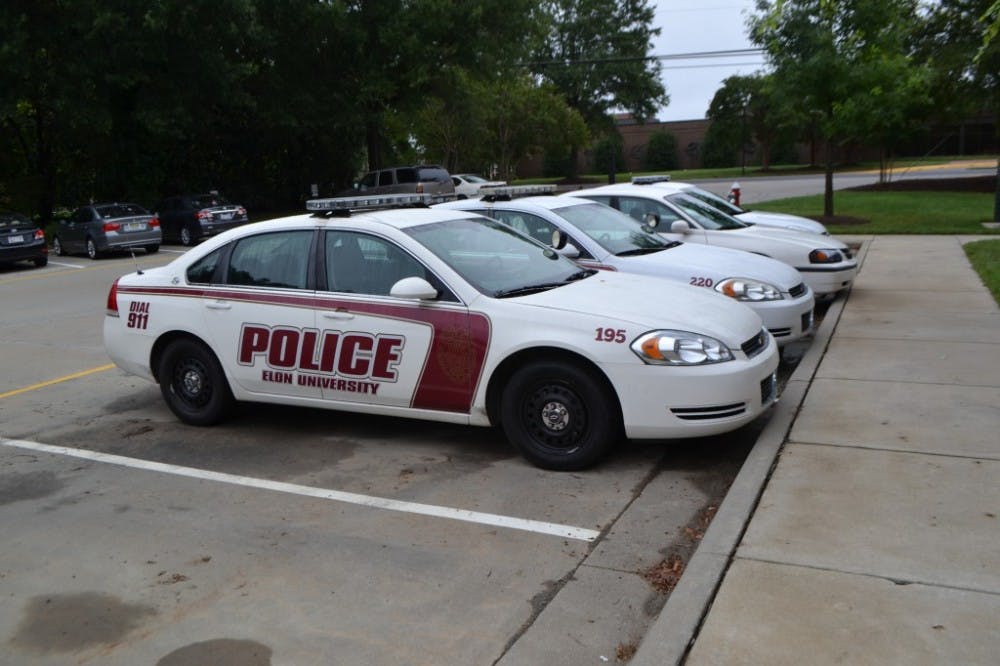After a relatively restful summer, Campus Safety and Police are getting back into the swing of things with new equipment, enforcing old policies and keeping students safe.
The biggest changes in regards to law enforcement on campus are the body cameras that Campus Police and Security officers wear now. They record everything that happens around the officers. There is a limited number of cameras, so they are given out on a first come, first serve basis to officers. According to Captain Vickie Moehlman of Campus Safety and Police, the cameras are very visible and students should have no trouble being able to tell if an officer is wearing one.
“This is something that all of our officers are very excited about,” Moehlman said. “It’s something that’s for the safety of our officers and all the students and citizens around.”
The cameras are meant to keep impartial eyewitness accounts, so officials later on can see what happened at the scene of a crime or accident.
Junior Amy Counihan is skeptical about the practicality of the cameras.
“Whenever I’ve had to call campus police because of an incident, it’s because they weren’t there, and as soon as they go there, everyone stopped what they were doing,” Counihan said. “On the off chance they happen to be there when something happens, they’ll be useful, but I feel like that just doesn’t happen very often.”
Senior Shannon Temlak is also hesitant about the cameras because of lack of information.
“It sounds like an interesting idea, but I feel like there should have been some sort of email letting students know that now they are wearing cameras. There definitely should have been better communication about it,” Temlak said. “I feel like there isn’t much point to wearing the cameras. We already have so many cameras around campus, and it would have been better to put cameras up in areas that don’t have any.”
Nothing major has happened yet, according to Moehlman, but she is sure the cameras will come in handy soon. Traffic accidents often happen in front of officers and the cameras could assist officers in describing the scene.
The most significant event to happen so far this school year that Campus Safety and Police dealt with was when lightning struck Oaks E Sept. 3.
The lightning entered through a dryer vent to Room 302 of the building, setting off the sprinkler system. According to Moehlman, the strike affected the power in the building and did not trigger the fire alarm system.
Campus Police responded immediately to the strike and made sure that everyone evacuated the bulding safely and worked throughout the night monitoring the situation.
Junior Meagan Schrock, a resident of Oaks E, was reassured by the Campus Safety and Police presence that night.
“We were kept well-informed and I felt completely confident in Campus Police’s ability to keep us safe,” Schrock said. “This situation could have gotten really crazy, but I thought they handled things in a very calm and organized way.”
No injuries were reported and all residents were relocated that night as a safety precaution. Moehlman was not aware of any damage to student belongings from the sprinkler system.
Other than dealing with the aftermath of the lightning, Moehlman said that they’ve mostly been dealing with routine business. One of their biggest initiatives, which started last year, is a push to get students’ bikes registered with Campus Safety and Police and to crack down on bike theft.
“The unique thing about registering is that you’ve given law enforcement a big step ahead if something bad happens,” she said. “Everyone’s bike has a serial number on it, and if it does get stolen, it makes it that much easier for us to find it.”
Counihan has had her bike on campus for the past two years, but was not aware that she had to get it registered until recently.
“They definitely did not publicize that information enough,” she said. “Everyone knows you have to get your car registered or you’ll get a parking ticket, but nobody ever told me I had to register my bike too. I don’t want to get trouble for not having it registered.”
Moehlman said that when it comes to bicycle theft, it is easy to take a bike when it’s not locked up and never put it back.
“If someone’s walking home at night and finds a bike, they just decide to take it and ride it home and then the owner doesn’t know what happened to it.” she said. “We find this is usually the case, so usually what happens if the bike is registered is that we find it and we can contact you.”
Campus Safety and Police also has a supply of heavy-duty bike locks to give away to students at no cost. They ordered 180 locks last year and have given away around 160.
Bikes parked outside of designated areas — such as railings, stairways and gazebos — are subject to confiscation. All bikes left on campus past Commencement are subject to the same.
According to Moehlman, bike thefts have gone down since they started the bike lock program. So far this school year, there has only been one bicycle theft on campus, and the bike was not locked at the time.
“It’s a good program and it’s definitely shown a reduction in larcenies,” she said. “It affects the crime rate because people know that campus police are paying attention to bikes.”


